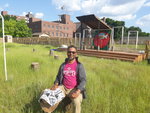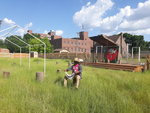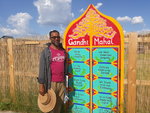


As Gandhi Mahal, the restaurant known for its sustainable food practices and community service, as well as its mouth-watering Indian dishes, was burned to the ground May 28, 2020, in the aftermath of the George Floyd killing, owner Ruhel Islam spoke out.
“Let my building burn,” he said, “as long as justice is served.” He called for the arrest of the four policemen involved in Floyd’s death. “We can rebuild a building, but we cannot rebuild a life.”
Rebuilding the restaurant at 3009 27th Ave. S. is just what Islam plans to do, but he expects it will take several years to happen. So he improvised and opened Curry in a Hurry on Oct. 6 of last year, in the Seward neighborhood at 3025 E. Franklin Ave.
He and his staff are operating out of the old Chef’s Shack at that location. “The owner of the building was great,” Islam said. “He was a customer, and we signed an agreement, and we have been serving take-out and delivery.”
Gandhi Mahal was known for its use of hydroponics and aquaponics. Islam raised fish in the basement of his building, and he grew vegetables and herbs. He also raised produce in several community gardens, providing fresh food for his menu.
Gandhi Mahal has joined with Minnesota Interfaith Power & Light (MNIPL), All Saints Episcopal Indian Mission and New City Church to form the Gandhi Mahal Interfaith Garden. The crops harvested will become an assortment of traditional dishes at Gandhi Mahal, as well as supply the healthy, traditional indigenous ingredients for meals prepared at First Nations Kitchen, a ministry of All Saints Episcopal Indian Mission.
Most of the fish were killed in the fire, but Islam saved a few and plans to start raising them again.
“We hope to build everything better through collaboration,” Islam said. “Even though I lost my building, we feel a sense of community.”
Islam said that because the voices of unprivileged people have not been heard, the tragedy of George Floyd’s loss of life happened. And it continues to happen. “We also have been fighting back hard against the pandemic, the coronavirus,” he said. “Then the police killed George Floyd, and we saw his life slowly going out as he said he couldn’t breathe. It was very sad.”
Coming from Bangladesh, Islam said he was used to a police state, but people were usually killed in crossfire, not by torture. “This was the torture of a human being, and we must speak out,” he stated. “If we do not speak out for the future, there will not be justice for everyone.” Islam recalled the words of Rev. Dr. Martin Luther King Jr., “Injustice anywhere is a threat to justice everywhere.”
Islam explained that he is grateful to be in America, where he can wake up, eat if he is hungry, and speak freely. And he is grateful for his democratic right to fight injustice.
He said he is also thankful to be on Dakota land, and very respectful of it. He recently attended a demonstration against Pipeline 3. “I am learning so much,” he said. “There should be a war criminal trial for the things that have happened, and reparations.”
He described learning as a small boy in school in Bangladesh that Columbus discovered America. “What? This was native land,” he said. “We learn from the past, and we have to fix the problem. History is written by the winners, and policy is written by the privileged people.”
But while he fights for justice, Islam is preparing to rebuild. “It took us a year to demolish what was left of the building, so we know it will take time to rebuild. So we are talking, talking, talking and growing, growing, growing.”
He has plans to create a Minnesota-made chili powder, and he is raising 300 chili plants. He is also growing peppers, tomatoes, cabbage, cucumbers, butternut squash, cauliflower and beans. He hopes to grow wildflowers and sunflowers to draw the bees. He is also growing hemp, and he plans to construct the new building from hemp bricks.
“At the end of the day, I’m a chef,” Islam said. “I want to share my recipes not only with the community, but with the world.” He said the world knows about this area, and he wants to bring people to see the 10,000 lakes, Minnehaha Falls and other landmarks.
“We will work with the climate, food and racial justice, which are all connected. I am working hard today for a better tomorrow.”
Comments
No comments on this item Please log in to comment by clicking here